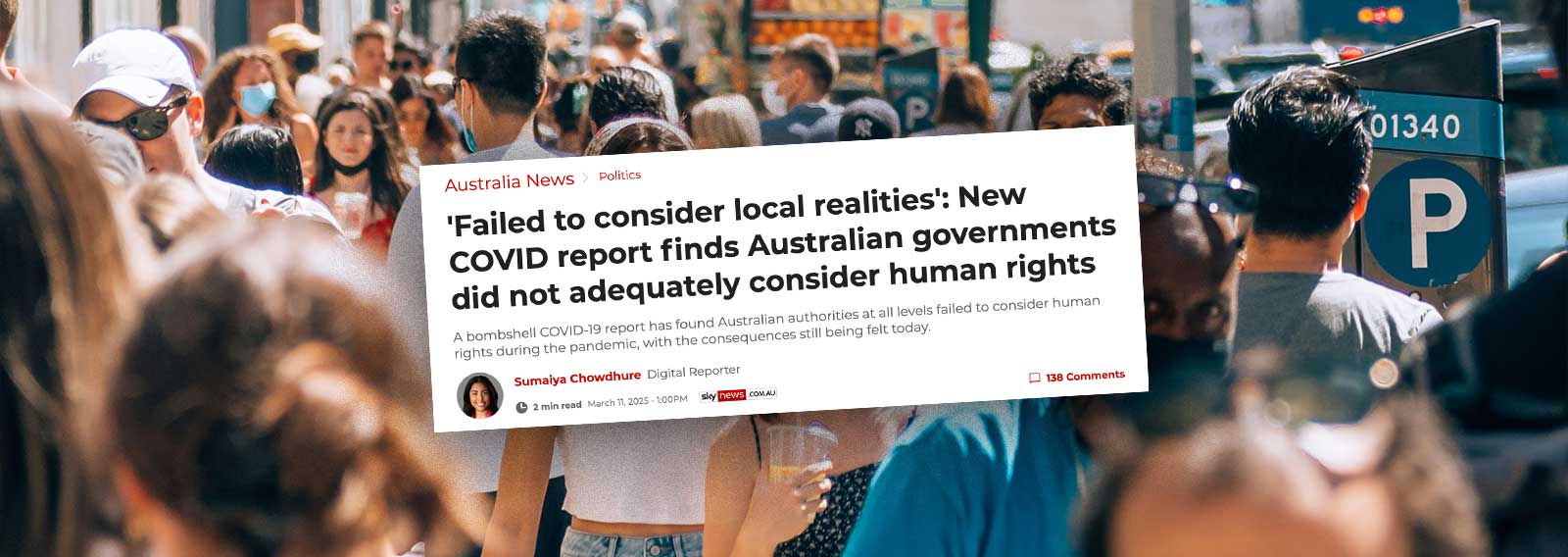One of the most shameful, frightening and alarming events of modern Western history took place from 2020-2022. Under the guise of saving us from a virus, the West – along with much of the rest of the world – went through one of the most shocking periods of statist control and violation of basic human rights.
The health fascism, the fear-mongering and panic porn, the statist overkill, the onerous lockdowns and mandates, and the forced medicalisation of millions of people were just some of the things we witnessed during this period. The mass violations of civil liberties, the heavy-handed government and police crackdowns, and the insane policy directives NOT based on any science (do not go out, even alone, on the beach; walk in one direction in supermarket aisles, etc) were mindboggling and painful to endure.
Now countless articles and numerous books have been penned looking at all this in great detail. My site has some 300 articles on these matters, and two years ago I suggested 21 key books on this (although there are now, of course, many more).
In this piece, I want to look at two items: one of the latest articles to document the mass harms inflicted on the people because of the lockdown lunacy, and a new website dedicated to getting some accountability out of our authorities for what they did to us.
The lengthy article I want to discuss has just appeared and is well worth reading in its entirety. English journalist Rosa Silverman wrote, “How Covid destroyed our lives, from newborns to pensioners.” It has this introductory line: “A growing body of evidence shows that the impact of lockdown continues to affect every generation – and will do so for decades to come.”
Here are a few choice quotes from the piece. She opens with these words:
Jostled by others on a packed commuter train, or crowding into a noisy pub, it’s easy to forget that recent inflection point when the world pressed pause on normal life. It is scarcely four and a half years since the UK Government, along with others globally, imposed the first national lockdown to reduce the spread of the coronavirus. But, in some ways, the trauma of that time was swiftly forgotten. We moved on with relief, and shudder today at those distant, bewildering memories of social distancing.
Yet a growing body of evidence suggests we haven’t truly turned the page on what now sounds more like a chapter from dystopian fiction. Instead, the effects of the Covid lockdowns endure, and will continue to be observed and charted for many decades to come. “We’ll probably be studying the impact of this for as long as we live,” says Adam Hampshire, professor of cognitive and computational neuroscience at King’s College London (KCL).
A startling reminder of the long-term fallout of those unprecedented restrictions came just this week, as new figures revealed that the number of people on sickness benefits rose to 3.9m, an increase of almost 40 per cent since the pandemic first hit.
That came hard on the heels of news this month that lockdowns may have caused premature ageing to teenagers’ brains. Research from the University of Washington found the measures resulted in “unusually accelerated brain maturation” in adolescents, and that this was far more pronounced in girls than boys. While the average acceleration in the development of the male adolescent brain was 1.4 years, for females it was 4.2 years.
If girls were more dramatically affected, this could be due to their heavier reliance on social relationships, the researchers have suggested. But this cohort is not the only one subject to the long-lasting impacts of lockdown. Across every age group, a wide range of effects has already been mapped. Experts believe that more will emerge in time. Indeed, it turns out that the way we managed Covid has dramatically affected every generation.
She presents alarming evidence of all the damage done to all groups: young children, teenagers, young adults, the middle-aged and pensioners. Consider a few words on what she says about teens:
Holed up in their bedrooms for hours each day, with just social media for company, teenagers missed crucial face-to-face interaction with peers at a formative, and quite often turbulent, life stage. The impact of lockdowns on their mental health has been well-documented. Disruption to their education and prolonged social isolation “exposed young people to many known risk factors for mental illness, raising serious concerns about their wellbeing,” researchers at KCL wrote in 2022.
One of the university’s studies, published in May 2021, found nearly half of 11 to 12-year-olds in this cohort reported an increase in symptoms of depression, while a quarter reported an increase in symptoms of post-traumatic stress disorder. A systematic review led by KCL’s Institute of Psychiatry, Psychology and Neuroscience found lockdown was associated with psychological distress, loneliness, boredom, fear and stress among young people. Again, girls were found to have been hardest hit.
So have these effects endured, or have teenagers bounced back? Research by University College London and the Sutton Trust, published last November, found a third of 17 and 18-year-olds reported the legacy of Covid was still harming their education and mental health. The study of more than 11,000 pupils found 44 per cent of Year 13 students could be classed as experiencing high psychological distress between November 2022 and April 2023 (when normal life had resumed), compared to 35 per cent in 2017.
She does not claim that no preventative steps should have been taken, but she concludes with these words:
Undoubtedly there were trade-offs to be made, and the argument over whether the benefits of lockdown outweighed the harms will continue to rage. But only in the coming years, it seems, will the full impact of our national shutdown be revealed: in the educational and career impacts on those who were young at the time: in the future alcohol deaths; perhaps in the proportion of pandemic pensioners who go on to suffer from dementia. We almost certainly haven’t yet seen the last of it. “There was a prolonged impact on people’s lifestyles and mental health,” says Prof Hampshire. “That is going to have downstream consequences.”
While Silverman might just be a senior writer at a newspaper, many others have spoken out about all this – and they are fully qualified to do so. Doctors, scientists, health experts, and other professionals are among 57,000 people who have signed a new statement on Covid and the need for rugged assessment and accountability of what was done to us – especially in terms of mandatory vaccinations.
I refer to The Hope Accord. It was released a few months ago, and folks are invited to sign the statement. One need not just be a professional to do so. The whole statement reads as follows:
WE, THE UNDERSIGNED HEALTHCARE PROFESSIONALS, SCIENTISTS AND CONCERNED MEMBERS OF THE PUBLIC, CALL FOR:
- THE IMMEDIATE SUSPENSION OF THE COVID-19 mRNA VACCINE PRODUCTS
A growing body of evidence suggests that the widespread rollout of the novel Covid-19 mRNA vaccine products is contributing to an alarming rise in disability and excess deaths. The association observed between the vaccine rollout and these concerning trends is now supported by additional significant findings. These include the discovery of plausible biological mechanisms of harm demonstrated in laboratory and autopsy studies, as well as high rates of adverse events seen in randomised clinical trials and national surveillance programs. Altogether, these observations indicate a causal link.This new technology was granted emergency use authorisation to address a situation that no longer exists. Going forward, the burden of proof falls on those still advocating for these products to compellingly demonstrate that they aren’t resulting in net harm. Until such evidence is presented, regulators should suspend their use as a matter of standard medical precaution. - A COMPREHENSIVE RE-EVALUATION OF THE SAFETY AND EFFICACY OF ALL COVID-19 VACCINE PRODUCTS
Independent investigations must be properly resourced to allow a comprehensive re-evaluation of all Covid-19 vaccine products. There must be a full exploration of mechanisms of harm to provide insight into their impact on the human body, both short and long-term. Effectiveness must be reassessed through a comprehensive review of actual clinical impact on illness and mortality, as opposed to synthetic results based on modelled assumptions. We call on the scientific community to come forward with findings from unpublished Covid-19 vaccine studies. This will help mitigate publication bias, whereby unfavourable results were often rejected or withheld due to fears of reputational damage. Crucially, government bodies and the pharmaceutical industry must also provide full transparency, granting access to previously undisclosed anonymised patient-level data from clinical trials and surveillance programs. These cumulative actions will help determine any real-world benefit of these products versus the true extent of the damage caused. - THE IMMEDIATE RECOGNITION AND SUPPORT FOR THE VACCINE-INJURED
The denial of vaccine injury is a betrayal of those who followed official directives, often under coercion from mandates restricting their access to work, education, travel, hospitality and sports.The vaccine-injured must be recognised and every effort made to understand their conditions. Support should include readily accessible multidisciplinary clinics offering investigation and treatment as well as appropriate compensation for all those who have been harmed. - THE RESTORATION OF ETHICAL PRINCIPLES ABANDONED DURING THE COVID-19 ERA
Fundamental and cherished principles of medical ethics were disregarded on the premise of an emergency. These included: ‘first do no harm’, informed consent, bodily autonomy and the notion that adults protect children – not the other way around. The precautionary principle was inverted. Also, particularly concerning was the erosion of free speech – a democratic principle that underpinned the ability to question untested interventions whilst ensuring other principles were upheld. The consequence was exposing the public, especially healthy young people – including children – to unacceptable risks of harm. Emergencies are never a reason to abandon our principles; it is precisely at such times that we most profoundly depend on them. Only after acknowledging they were wrongly abandoned can we commit to upholding them consistently and in doing so, better protect future generations. - ADDRESSING THE ROOT CAUSES OF OUR CURRENT PREDICAMENT
The medical profession must lead by admitting we lost our way. By drawing attention to these medical and ethical issues surrounding the Covid-19 response, we hope to validate and amplify the call to establish the relevant facts and ensure vital lessons are learned. An honest and thorough investigation is needed, addressing the root causes that have led us to this place, including institutional groupthink, conflicts of interest and the suppression of scientific debate. We ultimately seek a renewed commitment to the core principles of ethical medicine, returning to an era in which we strive for transparency, accountability and responsible decision-making throughout the spheres of medicine and public health.
Among those who have signed so far are some 1800 medical doctors, over 5000 healthcare professionals, and over 1800 scientists and academics. You are invited to sign your name to this important document as well, so please do.



















